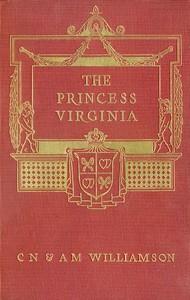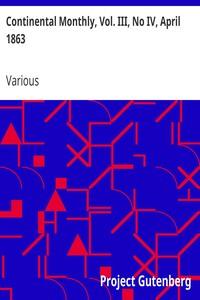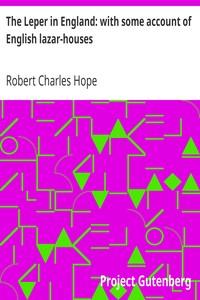Read this ebook for free! No credit card needed, absolutely nothing to pay.
Words: 62773 in 18 pages
This is an ebook sharing website. You can read the uploaded ebooks for free here. No credit cards needed, nothing to pay. If you want to own a digital copy of the ebook, or want to read offline with your favorite ebook-reader, then you can choose to buy and download the ebook.


: Experiments and Observations on Different Kinds of Air by Priestley Joseph - Chemistry Early works to 1800; Air Early works to 1800
ad despaired the preceding year.
In general, this effect may be presumed to have taken place in much less time than I have mentioned; because I never chose to make a trial of the air, till I was pretty sure, from preceding observations, that the event which I had expected must have taken place, if it would succeed at all; lest, returning back that part of the air on which I made the trial, and which would thereby necessarily receive a small mixture of common air, the experiment might not be judged to be quite fair; though I myself might be sufficiently satisfied with respect to the allowance that was to be made for that small imperfection.
FOOTNOTES:
The supposition, mentioned in this and other passages of the first part of this publication, viz. that the diminution of common air, by this and other processes is, in part at least, owing to the precipitation of the fixed air from it, the reader will find confirmed by the experiments and observations in the second part.
I have generally made inflammable air in the manner described by Mr. Cavendish, in the Philosophical Transactions, from iron, zinc, or tin; but chiefly from the two former metals, on account of the process being the least troublesome: but when I extracted it from vegetable or animal substances, or from coals, I put them into a gun-barrel, to the orifice of which I luted a glass tube, or the stem of a tobacco-pipe, and to the end of this I tied a flaccid bladder in order to catch the generated air; or I received the air in a vessel of quicksilver, in the manner represented Fig. 7.
There is not, I believe, any vegetable or animal substance whatever, nor any mineral substance, that is inflammable, but what will yield great plenty of inflammable air, when they are treated in this manner, and urged with a strong heat; but, in order to get the most air, the heat must be applied as suddenly, and as vehemently, as possible. For, notwithstanding the same care be taken in luting, and in every other respect, six or even ten times more air may be got by a sudden heat than by a slow one, though the heat that is last applied be as intense as that which was applied suddenly. A bit of dry oak, weighing about twelve grains, will generally yield about a sheep's bladder full of inflammable air with a brisk heat, when it will only give about two or three ounce measures, if the same heat be applied to it very gradually. To what this difference is owing, I cannot tell. Perhaps the phlogiston being extricated more slowly may not be intirely expelled, but form another kind of union with its base; so that charcoal made with a heat slowly applied shall contain more phlogiston than that which is made with a sudden heat. It may be worth while to examine the properties of the charcoal with this view.
Inflammable air, when it is made by a quick process, has a very strong and offensive smell, from whatever substance it be generated; but this smell is of three different kinds, according as the air is extracted from mineral, vegetable, or animal substances. The last is exceedingly fetid; and it makes no difference, whether it be extracted from a bone, or even an old and dry tooth, from soft muscular flesh; or any other part of the animal. The burning of any substance occasions the same smell: for the gross fume which arises from them, before they flame, is the inflammable air they contain, which is expelled by heat, and then readily ignited. The smell of inflammable air is the very same, as far as I am able to perceive, from whatever substance of the same kingdom it be extracted. Thus it makes no difference whether it be got from iron, zinc, or tin, from any kind of wood, or, as was observed before, from any part of an animal.
If a quantity of inflammable air be contained in a glass vessel standing in water, and have been generated very fast, it will smell even through the water, and this water will also soon become covered with a thin film, assuming all the different colours. If the inflammable air have been generated from iron, this matter will appear to be a red okre, or the earth of iron, as I have found by collecting a considerable quantity of it; and if it have been generated from zinc, it is a whitish substance, which I suppose to be the calx of the metal. It likewise settles to the bottom of the vessel, and when the water is stirred, it has very much the appearance of wool. When water is once impregnated in this manner, it will continue to yield this scum for a considerable time after the air is removed from it. This I have often observed with respect to iron.
Inflammable air, made by a violent effervescence, I have observed to be much more inflammable than that which is made by a weak effervescence, whether the water or the oil of vitriol prevailed in the mixture. Also the offensive smell was much stronger in the former case than in the latter. The greater degree of inflammability appeared by the greater number of successive explosions, when a candle was presented to the neck of a phial filled with it. It is possible, however, that this diminution of inflammability may, in some measure, arise from the air continuing so much longer in the bladder when it is made very slowly; though I think the difference is too great for this cause to have produced the whole of it. It may, perhaps, deserve to be tried by a different process, without a bladder.
Inflammable air is not thought to be miscible with water, and when kept many months, seems, in general, to be as inflammable as ever. Indeed, when it is extracted from vegetable or animal substances, a part of it will be imbibed by the water in which it stands; but it may be presumed, that in this case, there was a mixture of fixed air extracted from the substance along with it. I have indisputable evidence, however, that inflammable air, standing long in water, has actually lost all its inflammability, and even come to extinguish flame much more than that air in which candles have burned out. After this change it appears to be greatly diminished in quantity, and it still continues to kill animals the moment they are put into it.
This very remarkable fact first occurred to my observation on the twenty-fifth of May 1771, when I was examining a quantity of inflammable air, which had been made from zinc, near three years before. Upon this, I immediately set by a common quart-bottle filled with inflammable air from iron, and another equal quantity from zinc; and examining them in the beginning of December following, that from the iron was reduced near one half in quantity, if I be not greatly mistaken; for I found the bottle half full of water, and I am pretty clear that it was full of air when it was set by. That which had been produced from zinc was not altered, and filled the bottle as at first.
Another instance of this kind occurred to my observation on the 19th of June 1772, when a quantity of air, half of which had been inflammable air from zinc, and half air in which mice had died, and which had been put together the 30th of July 1771, appeared not to be in the least inflammable, but extinguished flame, as much as any kind of air that I had ever tried. I think that, in all, I have had four instances of inflammable air losing its inflammability, while it stood in water.
Free books android app tbrJar TBR JAR Read Free books online gutenberg
More posts by @FreeBooks

: The Princess Virginia by Williamson A M Alice Muriel Williamson C N Charles Norris Guipon Leon Illustrator - Fiction


: The Negro Farmer by Kelsey Carl - African American farmers Southern States; Agriculture Economic aspects Southern States





